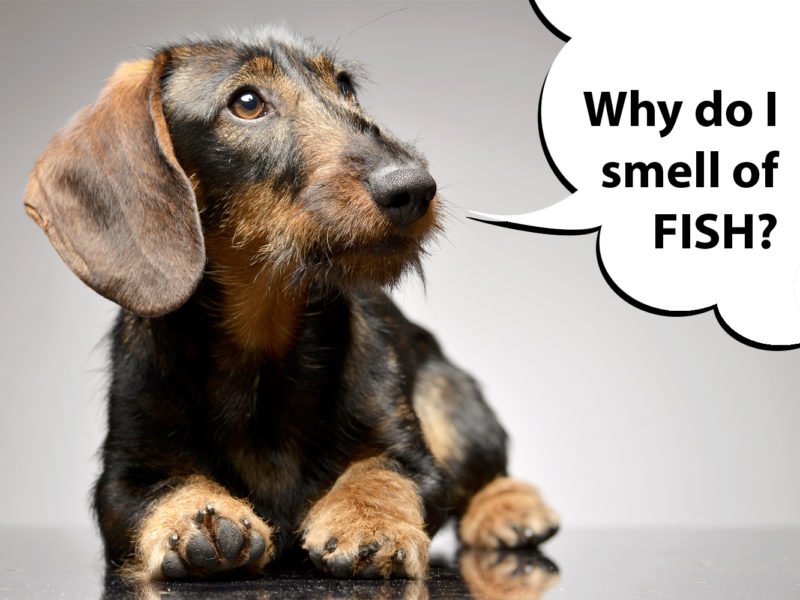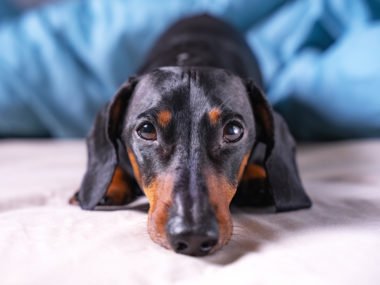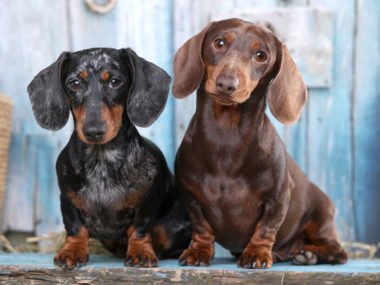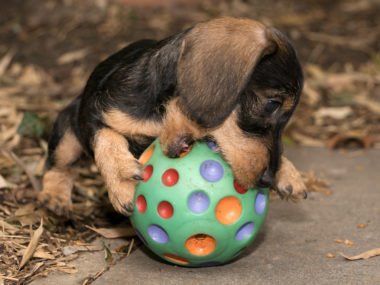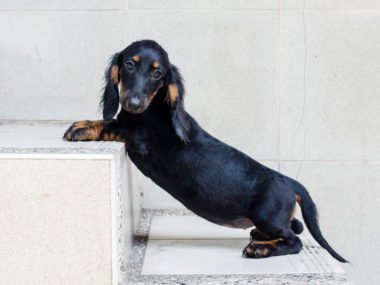Does your dachshund smell of fish? Is he scooting or dragging his bum around the floor? Does he keep trying to bite or lick his bum or tail? Does he look uncomfortable? If so, your dachshund may have a problem with his anal glands.
Why does my dachshund smell of fish? If your dachshund has developed a distinct fishy odour, it’s highly likely his anal glands are full of fluid and not expressing naturally. This problem can generally be resolved with dietary changes, pet supplements or a visit to the vet.
Most dachshunds express their anal glands naturally when they poop. But some need a bit of help or a change in diet to get things working as they should. Read on to find out what signs to look out for, how to drain the fluid that’s built up in the sacs, and when it’s time to visit the vet.
Table of Contents
- Why do dachshunds have anal glands?
- What are the signs a dachshund has anal gland problems?
- What happens if my dachshund can’t express his anal sacs?
- How do I treat my dachshund’s anal gland problem?
- Do dachshunds express their anal glands when scared?
- Do all dachshunds get anal gland problems?
- Will my dachshund’s anal glands get better on their own?
- How often should I express my dachshund’s anal glands?
- What if my dachshund has recurrent anal gland problems?
- Will my dachshund’s anal sacs need to be removed?
- Should I bath my dachshund after the anal glands have been expressed?
- What do I do next?
This article is based on research and personal experience as a Dachshund owner of 10+ years. I’m not a Vet or qualified dog behaviourist.
Why do dachshunds have anal glands?
The anal glands are small sacs found on either side of your dachshund’s bum. They’re full of foul smelling fluid that your dachshund uses to mark his territory. When your dachshund poops, he naturally releases fluid from his anal sacs. Other dogs then pick up on that unique scent in his poop. That’s the reason dogs are so obsessed with each others poop, and why they sniff bums when they first meet. It’s basically how they communicate!
What are the signs a dachshund has anal gland problems?
These are the signs a dachshund has anal gland problems:
- A distinct fishy odour
- Scooting or dragging his bum along the ground
- Excessive licking, chewing or biting his bum
- Biting, chewing or chasing his tail
- Red or sore looking bum
- Looking uncomfortable when sitting down
The most common sign your dachshund has anal gland problems is a distinct fishy smell. This comes from fluid that leaks out when the sacs are full. Another indicator is scooting or dragging his bum along the floor. The reason he does this is to put pressure on the sacs to try and get rid of the build up of fluid. It’s pretty uncomfortable for a dachshund and he’s just trying to fix the issue as best he can!
What happens if my dachshund can’t express his anal sacs?
If your dachshund’s anal glands don’t drain fully or properly when he poops, the build up of fluid in the sacs can lead to blockages or impactions. If left untreated, dachshunds can get infections, swelling or abscesses.
How do I treat my dachshund’s anal gland problem?
This is how to treat your dachshund’s anal gland problem:
Visit the vet
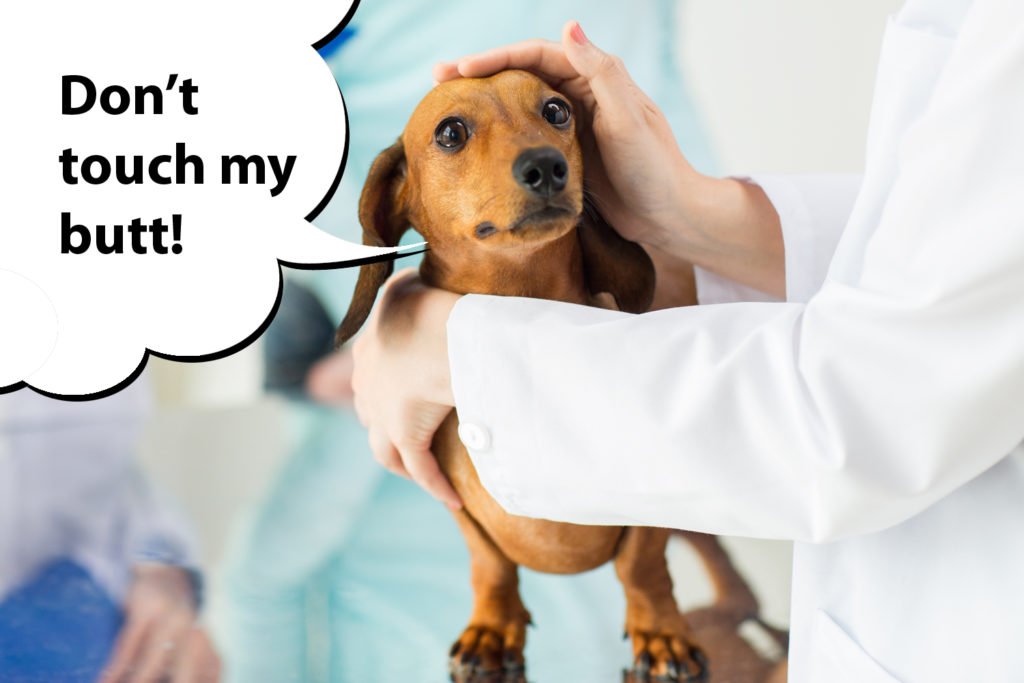
As with any health problem, the first thing you should do is visit your vet. When the sacs holding the fluid are full, blocked or impacted, it can be very uncomfortable for a dachshund, and can sometimes lead to abscesses, swelling or infection. If necessary, your vet can empty the anal glands to resolve the issue. However, if your vet regularly drains the anal glands manually, it can sometimes mean they always need to be done manually. And that’s why it’s also important to look at your dachshund’s diet, to help prevent build up of fluid in the future.
Make dietary changes
Most anal gland problems can be resolved or significantly helped with dietary changes. Basically, your dachshund needs more fibre and roughage in his diet to have a more solid poop. The consistency of the poop needs to be firm enough to put pressure on the anal sacs so they release the fluid naturally. If the stools are too soft or small, they might not put enough pressure on the anal sacs, stopping them from emptying as they should. Adding a spoonful of All-Bran (the stuff that looks like twigs) or pumpkin to your dachshund’s meal once a day, generally gets the glands working again. This isn’t always the solution but does work in the majority of cases.
Pet supplements
Some people add pet supplements like Pro-Fibre or Glandex to their dachshund’s food to support healthy anal gland function. Before doing this, you must speak to your vet. You need to be sure you’re treating the right problem, in the right way. Don’t diagnose and treat your dachshund yourself. Get him checked over by a vet in case there’s a tumour or something more serious going on. Once you get the all clear, you can then discuss supplement options with your vet.
Express the anal glands yourself
Don’t ever attempt to express your dachshund’s anal glands without speaking to your vet first. Most issues can be resolved through simple dietary changes or supplements, so they may not need doing at all. If your dachshund gets recurrent problems, the glands may need to be drained manually. Ask your vet how it’s done and get them to show you exactly how to do it. If you get it wrong or apply too much pressure, you could cause impacted anal glands or damage the sacs which could lead to infection. Expressing them yourself should be a last resort. It’s an extremely smelly and mucky job that’s best left to the professionals! It’s much better to get the anal glands checked by the vet and emptied if and when they feel it necessary.
Go to the dog groomers
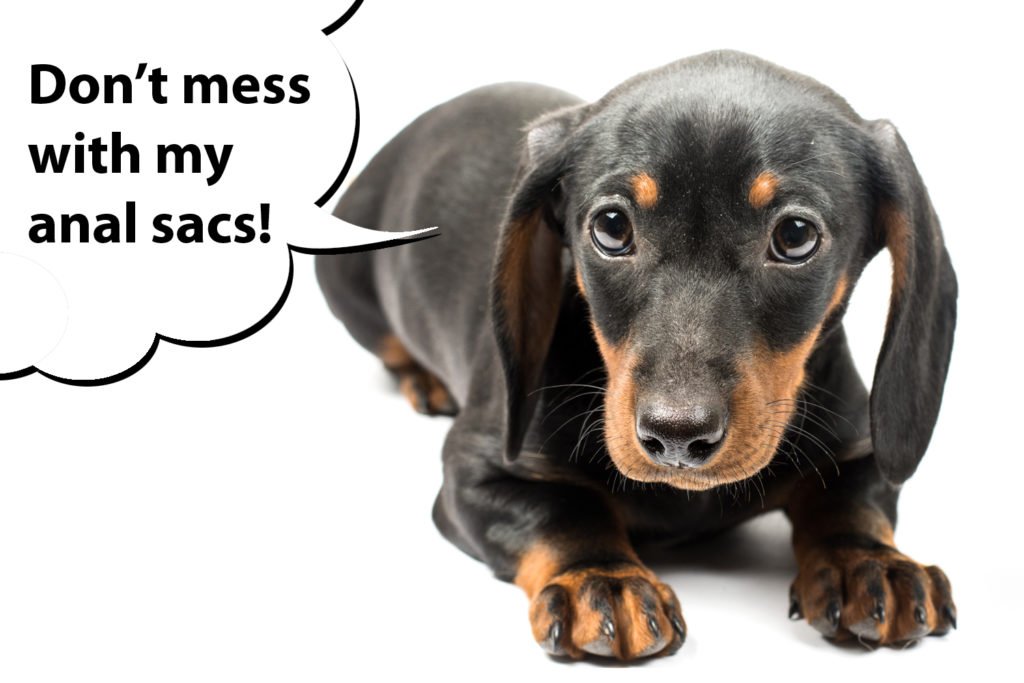
Some dog groomers may offer to express your dachshund’s anal glands as part of their service. Only allow them to do this IF they actually need doing. Never agree to have your dachshund’s anal glands manually expressed if they’re working naturally on their own. And make sure the dog groomer knows exactly what they’re doing too. Getting this wrong, expressing when they don’t need doing, or doing it too often, can lead to complications. So it’s best to get your vet to check your dachshund over before allowing anyone else to mess with his anal glands!
Do dachshunds express their anal glands when scared?
Yes. Dachshunds can sometimes express their anal glands when frightened. Possibly at a trip to the vets or when there’s fireworks or thunder outside. You’ll know when it’s happened because there’ll be a distinct fishy odour in the air.
Do all dachshunds get anal gland problems?
No, not all dachshunds get anal gland problems. Some will never have an issue in their lifetime. Some will have an occasional issue, and some will have recurrent problems that need ongoing treatment at the vets.
Will my dachshund’s anal glands get better on their own?
No, don’t leave your dachshund to struggle with anal gland problems. It can be uncomfortable and could lead to infection, swelling, abscesses or some other complication. Book to see your vet and get them to check your dachshund over to be sure there’s nothing more serious going on.
How often should I express my dachshund’s anal glands?
Your dachshund’s anal glands only need emptying when the sacs are full and not working naturally. Expressing them when they don’t need doing, or doing them too often, could cause scar tissue and inflammation. If your dachshund shows any signs of anal gland problems – like smelling of fish or scooting around on his bum – pop to the vet for a checkup and advice.
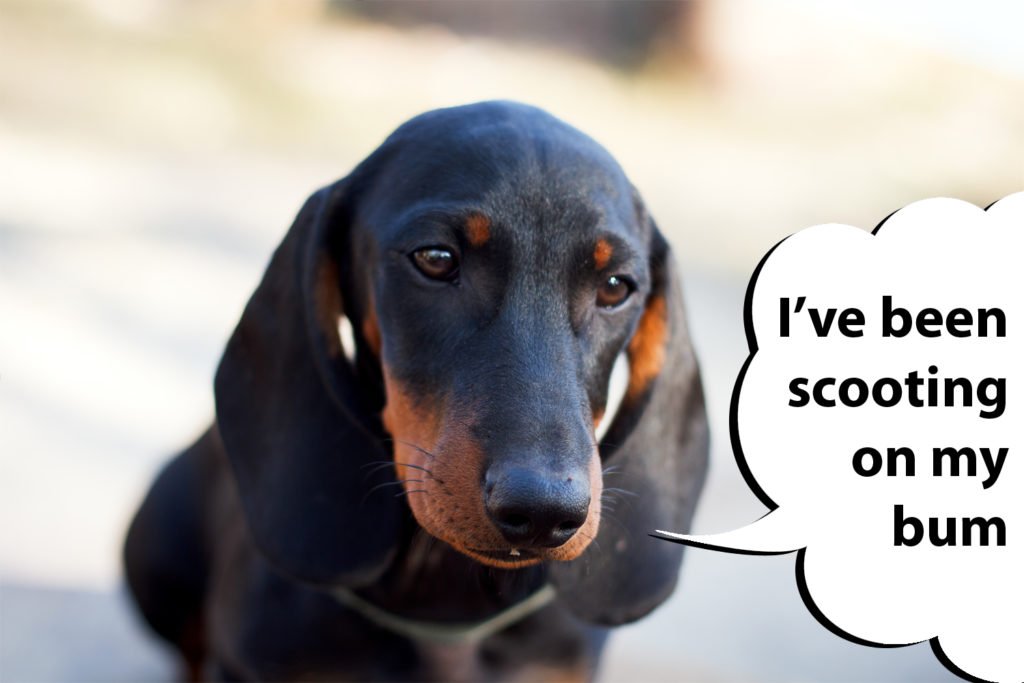
What if my dachshund has recurrent anal gland problems?
Some dachshunds do perfect solid poops but still have problems with their anal glands. It’s actually more common in smaller dog breeds, so diet and supplements might not always work. In these cases, it’s best to speak to your vet for advice. You need to be sure there’s nothing else causing the problem, like a growth or tumour. It may be you just have to schedule regular appointments with your vet to have your dachshund’s anal glands drained manually.
Will my dachshund’s anal sacs need to be removed?
In the vast majority of cases, the anal sacs won’t need to be removed. Most problems can be resolved with dietary changes, supplements or having them manually expressed. Removal would be an absolute last resort. Even though most procedures are successful, there can be complications such as faecal incontinence. So make sure you exhaust all other options before considering surgery.
Should I bath my dachshund after the anal glands have been expressed?
Yes, it’s a good idea to give your dachshund a bath after his anal glands have been expressed. At the very least, wipe over his bum to get rid of the foul smelling fluid on his coat and skin. Once clean, he shouldn’t smell of fish any more!
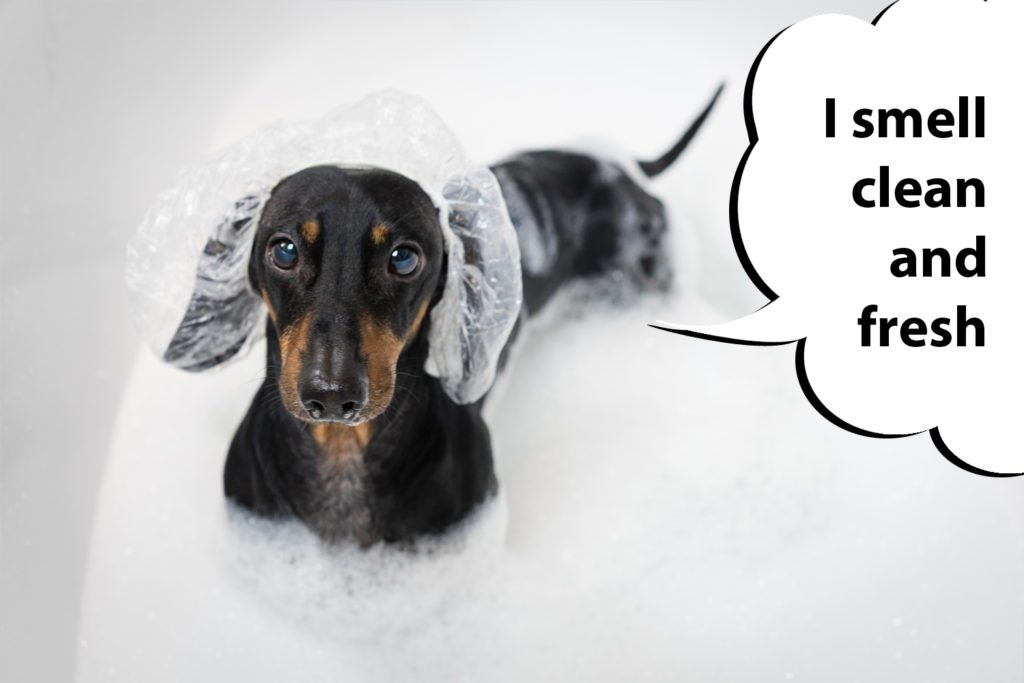
So there you have it! Most dachshunds anal gland problems will be helped by increasing fibre in their diet or taking specific anal gland supplements. When your dachshund’s poop is the right consistency, things will start to work naturally and the fishy smell will disappear! Those dachshunds that don’t respond to dietary changes may need ongoing treatment on a regular basis. So watch for signs and, if the fishy smell reappears, you’ll know it’s time to pop to the vets!
What do I do next?
If you read all the way to the end of this article, you’re exactly the sort of person I’d LOVE to join my Facebook Group. Your support for my blog means everything to me. And, if you found this article helpful, please kindly share below. Thankyou! 💋

